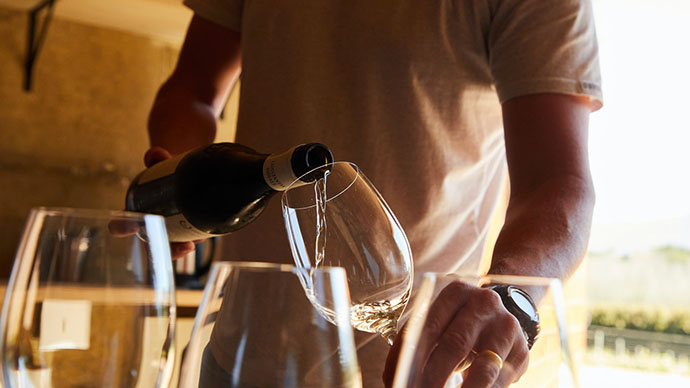Wine is one of the most popular beverages in the world. Whether you like red, white, sweet, dry, or sparkling wine, there’s a type of wine that will suit your taste. However, the way you drink your wine may not be the same as how the winemaker intended you to drink it. That’s because the winemaker has no control over the way you drink his wine. There are many reasons why you may like to alter the flavor of the wine you are drinking. Learning how to make your own wine brand can be an exciting venture for an entrepreneur. Want to learn how to create your own wine brand that generates profits?
How to Make Your Own Wine Brand.
What is The Private Label Wine Business?
Retailers and restaurants are looking for ways to boost revenue, increase margins and create a unique brand identity as the private label wine business is picking up steam. It almost sounds like a contradiction – having your own wine label without a winery. Private label wines are becoming more and more popular in the U.S. Launching your own private label wine can boost revenue, increase profit margins, and help you create a unique brand identity that sets you apart from the other competitors.
Private label wines are made by “relabeling” or “rebagging” (rebranding) someone else’s product. The process of relabeling is straightforward: You simply purchase the right to use a well-known brand name on an existing product and then add your own unique selling proposition (USP) to make your product more appealing to consumers. There are hundreds of thousands of products available for relabeling, and many of them are low-priced items such as vitamins, soft drinks, and paper and ink products. Others are higher-priced items such as furniture, cars, and, in the case of wines, alcoholic beverages.
Why Private Label Wine Business.
The current estimates are that private label wines now account for about 5% of all wine sales in the U.S., and that percentage could go up. Some experts predict that by the year 2020, private label wines will account for as much as 20% of all wine sales. That would put the private label market on par with other private label markets such as personal label food products or diapers, which today constitute a considerable share of supermarket sales.
And in many countries around the world, including France and Italy, private label wine accounts for nearly one-third of all wine sales. Besides the economic appeal of selling personal label products, there’s also the branding aspect that can help to differentiate companies from other retailers or restaurants.
A private label wine doesn’t say “private label” on the bottle. It looks like any other wine a casual wine drinker would drink. Private label wines are not always the case in the restaurant and hotel business. Private label wines are becoming more popular as customers become more adventurous. They might not know the wine or the label, but they are tempted to try it. Having an eye-catching label is just as effective as having a first-class wine in attracting attention.
Rather than being used to attract cost-conscious customers, it is a way to attract affluent, sophisticated customers. That may not be true for Costco, which is focused on selling huge quantities at low prices. Still, it works for the hospitality business, where there is a constant search to differentiate oneself from the competition. Everyone from a national chain of steakhouses to a small boutique hotel chain might be interested in creating a private label wine.
Examples of Private Label Wine Business.
Kirkland Signature line of wines at Costco.
The best example of a private label wine business taking off is the Kirkland Signature line of wines at Costco, which is already the #1 wine retailer in the U.S. Through its exclusive partnerships with wineries in the United States, Costco can offer unique, premium wines at half the price anywhere else.

Costco has created an entirely new category of wine buyers who are willing to pay extra for quality. This is a classic case of a niche being discovered and then aggressively exploited by an innovative entrepreneur. In the case of the Costco wines, they are selling for $7.99 per bottle and often go fast. They are sold in specially designed, colorful, easy-to-open plastic containers with a flip top that keeps the wine fresh.
Trader Joe’s.
Since 2002, Trader Joe’s has sold over 50 million cases of private-label wine. A growing number of retailers – including some national wine and liquor chains and supermarkets – are following suit, viewing the private label wine business as a way to boost revenue and grow margins. According to some estimates, the margins on private label wine bottles are 10 to 15 percent higher than on bottles from national brands.
Wine experts point out that retailers are shortening their supply chain by squeezing out some of the middlemen making their mark-ups every time they sell a case of wine. You are getting your wine directly from the winery, after all. It is no longer out of the ordinary for private label wines to show up on the shelves of supermarkets.

Trader Joe’s started as a small, family-owned store in California but has since expanded to over 180 locations, with plans for more. The company is very conscious of its image and makes a point of staying “in touch” with its customers. They offer lots of seminars and other educational programs and have a very active customer relations department. They’re Not Going To Let Anyone Steal Their Margins! That’s why, when it comes to private label wine, TJ’s will match or beat the lowest price they can find on any competing brand.
They also don’t limit you to just one distributor – like most retailers – and they’ll work with you as long as you are a responsible, long-term customer. They’ll send you news and updates on their promotions and special offers, and they’ll even send you coupons to use in their store. Here’s something else worth noting: Since they carry so many different brands, they can often obtain wines that other retailers don’t have in stock. That means you’re getting more for your money.
Total Wine.
Total wine is one of the few national wine and spirits stores that sell private label wines. They have a large selection of wine from all over the world at meager prices. One case of wine usually contains two bottles, and each bottle is $9.99 or less. This means you can get a lot of different wines for a low price.
How To Get Started .
Determine Your Customers’ Preferences and Pricing Structure.
Industry insiders say that the first step is to figure out what types of wine your customers enjoy drinking and the average price of the bottles they are ordering. You need to make a few projections about the future of your business. You don’t want to be stuck with dead inventory when you order large quantities of wine.
However, you also don’t want to sell the wines at such a discount that you lose money on every bottle you sell. Let’s say that you decide to sell your wines by the case and that the typical case size is five bottles. Also, you have determined that most of your customers buy wine by the patient and are willing to pay $20 per case on average for the bottles they purchase. It should be pretty clear that you should try to set your prices as high as possible while still being willing to stay in business.

Region and Style of Wine.
The wines you choose should be compatible with the restaurant’s style of wine and region. It’s time to reach out to wineries that may be interested in a deal. Some wineries can accommodate a wide range of order sizes, while others prefer to only work on smaller or larger orders.
As always, it is essential to remember that the quality of the wine is far more critical than the size of the order. However, it is also true that larger orders provide a level of financial stability, which allows the winery to make far fewer compromises in the winemaking process. This can result in higher-quality wines. So, if possible, always favor larger orders whenever they are available.
Start to Create Your Wine Brand.
From creating the label to the type of cork, the vintner will be with you every step of the way. It also includes the type of grape used, the alcohol level, the fermentation process, the blending process, the aging process, and everything else involved in making wine. They will take care of all the details, so you don’t have to worry about anything except collecting your sales proceeds. Independent design companies design wine labels, cases, and other promotional materials. The people who will create the title for your wine will select the country. Within that country, the region, the subdivision, the specific vineyard, and the specific bottle you sell.





